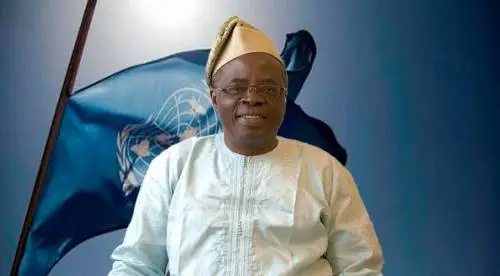
Prof. Babafemi Adesina Badejo, a former head of political affairs at the United Nations-African Union (UN-AU) Mission in Darfur (UNAMID), has urged President Bola Ahmed Tinubu to abandon any plans to restructure Nigeria.
Instead, he proposed a return to Nigeria’s pre-civil war confederal system of government, considering it the most suitable for the country.
Badejo, who assessed the president’s performance over the past month, stated that Tinubu could surpass his predecessor, Muhammadu Buhari, if he maintains the current pace.
In his inaugural lecture at Chrisland University in Abeokuta, Ogun State titled “Interests,” the professor of political science and international relations argued that the talk of restructuring the country is deceptive.
According to Badejo, the myriad of challenges facing Nigeria today, which have led to calls for restructuring, would be better addressed under a confederal system.
He remarked, “I am extremely proud of Chief Obafemi Awolowo’s unrivaled achievements in the Western Region. However, we went off course when we began focusing on centralization. This led Col. Chukwuemeka Ojukwu and General Yakubu Gowon to opt for a confederal Nigeria.”
“Unfortunately, external and internal factors derailed that agreement, leading to the civil war,” he added.
“If we want to rebuild Nigeria, we must start with a confederal arrangement. All this talk of restructuring is nothing but deception. The issues that need restructuring are more fundamental.”
Badejo criticized Nigeria’s current militaristically centralized federalism and emphasized the need to move away from it. Instead, he suggested giving more power to each region, eliminating unnecessary spending on regional entities and governor-generals.
He stated, “Everyone should take charge of their territory and build from there. This will compel those who rely solely on federal allocations to work harder.”
Badejo also asserted that President Tinubu would not be able to address corruption significantly due to institutional challenges beyond his control.
He remarked, “When we consider our institutions today, the realities we face go beyond Tinubu. Just look at our National Assembly, the saga of ‘off the microphone.’ That is the leadership we have at the National Assembly.”
“However, Tinubu cannot stop it because of the various interests involved. He cannot prioritize corruption eradication in his efforts,” Badejo explained.
Badejo concluded by stating that politics revolves around interests and aims to serve the public.
He regretted that the 1999 Constitution has proven to be an unworkable document.
